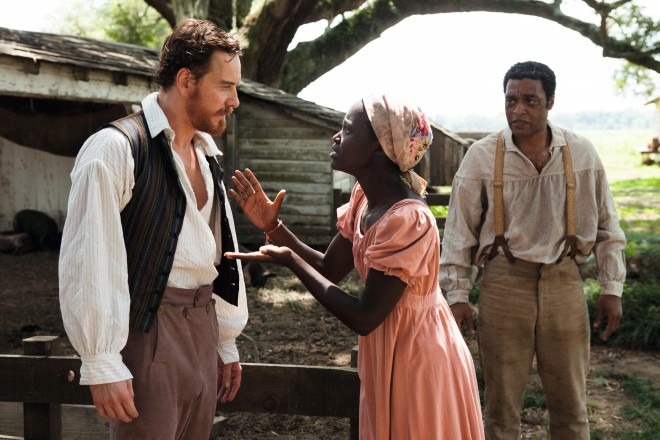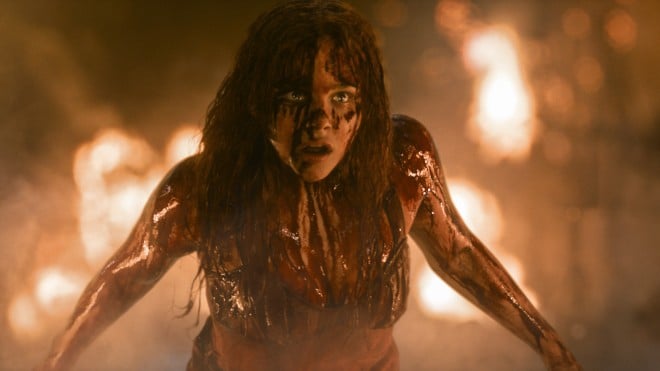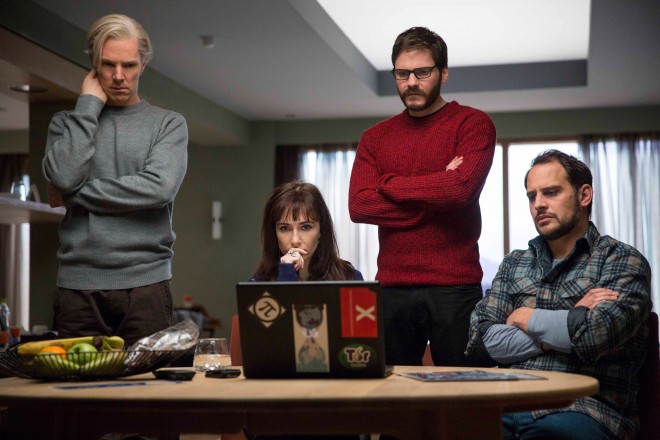Movie reviews: 12 Years A Slave, Carrie, A Touch of Sin, The Fifth Estate
Brian D. Johnson on what to see at the movies this weekend
Share

Halloween is almost a week away, but the horror is already upon us. Of the weekend’s four new releases reviewed here, only one qualifies as a horror movie—Carrie. But there’s more genuine horror in both 12 Years a Slave and A Touch of Sin than in Kimberly Pearce’s post-feminist remake of Brian De Palma’s classic. Steve’s McQueen saga of 19-century bondage and Jia Zhangke’s contemporary epic of vengeance in a corrupt China are powerful pictures that confound us with jarring images of human brutality amid natural beauty. Both will likely find a place on my year-end top 10. As for The Fifth Estate, a thriller about unchained data, the horror is only of the psychological kind. But as played by Benedict Cumberbatch, protagonist Julian Assange could give Hannibal Lecter lessons in sangfroid.
12 Years A Slave
Of the four films, 12 Years A Slave is by far the most harrowing, and momentous. There are still more films to come in 2013, but from where we stand now, it’s shaping up to be the movie of the year. I haven’t seen it since TIFF, but its images have not left me. Here’s an expanded version of what I wrote about it at the time:
Even though it’s based on a true story that happened before the American Civil War, 12 Years A Slave waylays us with a sense of tremendous urgency. I say “us,” not just “me,” because I walked out of the theatre with that weight of collective sorrow you get from a good funeral. Leaving the cinema in a hushed congregation. Afraid to break the silence. Lost for words. Feeling that nothing I could say or write could begin to address the injustice, horror and degraded nobility that the movie so eloquently portrays. But I was left with contradictory responses. You wonder how a movie so hard to watch can be so ripe with beauty: the narrative is gilded with lush Southern landscapes that serve as a silent witness to the cruelty. You are amazed that the movie exists, such an opulent vision of atrocity, yet appalled that its story has taken so long to reach the screen. Not just this specific story, but the story of American slavery. Lurking in the background of so many Hollywood movies, it never been so fully represented until now.
12 Years A Slave is based on the memoir of Solomon Northup, a free black man in the North, and a skilled carpenter and fiddler, who was lured to Washington, D.C. by a pair of circus promoters in 1841, then kidnapped and sold into slavery in New Orleans. After the cartoonish pulp of Quentin Tarantino’s exhilarating revenge fantasy, Django Unchained, Steve McQueen’s epic is sobering, to say the least. Played with simmering yet titanic force by Chiwetel Ejiofor, Northup is no Django-like action hero. He is a literate, sophisticated man who struggles to defend his dignity as it is assaulted, diminished and ground into the dirt.
McQueen has marshaled a strong cast. Benedict Cumberbatch has a smallish role as the plantation boss who first purchases him at auction. Although he has no compunction about separating a slave woman from her children, this patriarch—who goes so far as to give Northup a violin—is a relatively gentle man compared to his next owner, an alcoholic sadist named Epps (Michael Fassbender) who runs a cotton plantation. Yet Fassbender makes this monster utterly credible.
As with Hunger and Shame, McQueen doesn’t pull any punches. There are scenes of unmitigated brutality, both a lynching and a flogging. Yet despite the extremity of the drama, McQueen has not crafted a black-and-white morality tale of good vs. evil. It’s not relieved by the typical “triumph of the human spirit” that passes for catharsis in Hollywood. It’s too troubled and complex for that, as McQueen delves into the layers of compromise and guilt slaves endured in their struggle to survive.
Northup isn’t just a victim. He suffers the more nuanced indignity of collaboration, as he lives by his wits, using his education, while being careful not reveal too much of it. The heart of the narrative revolves around a young female slave named Patsey, the plantation’s most productive cotton-picker, who becomes the target of Epps’ sexual lust. Lupita Nyong’o—a Mexican-born, Kenyan-raised graduate of Yale’s film school—makes her screen acting debut in this role, and her performance is a revelation. The movie’s most wrenching scene is one in which she is whipped for what feels like an eternity. McQueen shoots it in a single unbroken shot, not allowing the camera, or the audience, to look away.
Producer Brad Pitt made the movie happen, and gave himself a modest role as the story’s white knight, a Canadian carpenter who eventually comes to Northup’s rescue. But freedom comes as more of a sad denouement than a salvation. The tragedy cannot be undone. This is not a Brad Pitt movie, a tale of a white guy saving a slave; he’s just the story’s concierge. The film belongs to Chiwetel and the remarkable ensemble that surrounds him. With McQueen, they’ve created a landmark picture of devastating power.
Carrie

Why remake Carrie? Good question, given that the original movie was so potent, and that Sissy Spacek’s iconic performance as Carrie was so definitive. The 1976 movie that Brian De Palma adapted from Stephen King’s novel has become a landmark of sorts. It’s the original Mean Girls, a cautionary tale about high-school bullying with catastrophic consequences, made decades before social-media shaming pushed the issue to the fore. But if you are going to update Carrie, Kimberly Peirce, who made the Oscar-winning Boys Don’t Cry (1999), that seminal movie about persecuted sexuality, would seem an interesting choice of director. You would expect this feminist filmmaker to take a radically different approach from De Palma, who opened his movie with voyeur’s paradise of frontal nudity in the girls’ shower room. But Peirce’s 2.0 upgrade is not as different as you’d expect. It’s a very literal remake of the De Palma movie with some revisionist touches.
First the differences. For those who don’t want to wait all the way to the end for a blast of horror, Pearce kicks things off with a grisly childbirth scene, in which Carrie’s screaming mother gives birth to her alone, and is torn between embracing this spawn of Satan or killing her with a pair of scissors. Then fast-forward to high school, and things start took look more familiar—though Peirce, predictably, eliminates even a soupcon of nudity in the shower sequence.
She goes through the motions of making a post-feminist, post-Internet Carrie, set in the Facebook world of contemporary youth. The director dutifully incorporates the issue of cyber-bulling—in the shower scene, after Carrie reacts to her first period with bewildered screams, a cellphone camera captures her humiliation as the girl mob pelts as her with tampons. The video will go viral.
Chloe Moretz, who cut her baby teeth as the action star of Kick-Ass, may seem an apt choice for the lead. Yet she faces an impossible task. No one could top Spacek’s visceral yet ethereal performance, which still seems utterly real almost four decades later. (I re-screened De Palma’s film again this week.) And the Moretz version of the character is cut from different cloth. Spacek was a fragile, damaged creature who could see her own weirdness in the mirror. She channelled her telekinetic power as a terrifying force beyond her control, even in the end. Moretz is self-possessed right from the start. She gets a kick out of her powers and works to master them, like a nascent comic-book superhero, doing levitation exercises on the furniture and orchestrating flying objects with her hands.
In one of the key changes from the original script, she turns her powers on Mom before heading off to the prom and locks her in the closet. She doesn’t just dodge Mom’s mad Christian rants; she corrects her: “I didn’t sin. You sinned!” And in the final act, this heroic, hyper-conscious Carrie takes her vengeance much further than in the original. It’s more protracted and diabolical. Plus, she’s armed with an arsenal of digital special effects— Kick-Ass Carrie has powers that film technology could not dream of in 1976.
Cast as her mother, Julianne Moore takes an even more marked departure from her original character, who was over-played by Piper Laurie. Though she got an Oscar nomination for her over-acting, Laurie’s performance doesn’t hold up—her unmitigated hysteria flies way over the top, as if she’s failing an audition for a Tennessee Williams play. Moore seems to have over-compensated, keeping the character on a low, psychotic simmer. She’s a repressed knot of self-hatred. She’s also acquired a habit of abusing herself by cutting and scratching her skin—some clinical mortification of the flesh. To that extent, she is less of a villain, more a victim of her own self-hatred in Peirce’s feminist-lite paradigm. Incidentally, the filmmakers have also upped the ante of high-school sexuality, adding a dash of teenage sex (as normal dating activity) and a pregnancy.
But aside from all those tweaks, the new Carrie has been very closely cloned from the old one. Entire scenes, shots and lines of dialogue are recycled from the original. And the structure remains completely intact. It’s as if Peirce and her screenwriters (Lawrence D. Cohen and Roberto Aquirre-Sacasa) wanted to rehabilitate a classic and perform some cosmetic surgery, but were scared to mess with the bones of a story that worked so well in the first place. But by taking a safe, piecemeal approach—and treating the original a sacred text rather than completely reinventing it—the result at times seems weirdly anachronistic.
Although fundamentalist Christianity is alive and well in America, it’s much less likely these days that a schoolgirl of Carrie’s age would be ignorant of menstruation. And although bullying is a serious problem in contemporary schools, it’s also a hot-button issue. There’s no apparent awareness of bullying among the characters, who seem stuck in a time warp.
Which brings us back to the question, why remake the movie at all? There’s a commercial rationale, of course. It’s a property that can be re-packaged and resold for a young audience that hasn’t seen the original. The problem is, Carrie has penetrated pop culture so deeply that even kids who haven’t seen the 1976 movie are aware of it. How can can you shock people when it’s impossible to spoil the ending: the blood-soaked girl in a prom dress is one of those images that’s been permanently carved into the Halloween canon. Even Carrie’s pig’s-blood humiliation does not so tragic, because we are just waiting for her to unleash her superpowers.
A Touch of Sin

Against panoramic vistas, China’s Jia Zhangke directs a suite of four stories splattered with vigilante gun violence, not all of it reprehensible. A kind of Chinese Pulp Fiction with a political pulse, it adds up to a powerful portrait of desperate individuals driven to extremes by official corruption and runaway commercial development. They range from a mine worker (Jiang Wu) who picks up a shotgun to get even with a super-rich boss, to a sauna attendant (Jia’s wife and longtime leading lady Zhao Tao) who wreaks bloody vengeance against a sexual predator. As a contemporary revision of the W?xiá genre, these ultra-violent tales of explosive retribution are set against gorgeous landscapes in various far-flung corners of China. What’s remarkable is that Jia partly based his stories on sensational real-life crimes that were well-known from the country’s newspapers. They add up such a massive critique of China’s new Cultural Revolution—the decadence of unbridled state capitalism—that it’s surprising government censors have allowed the film to reach the screen.
For my interview with the director, conducted during TIFF, go to: Jia Zhangke on violent redemption, censorship and Ai Wei Wei.
The Fifth Estate

This breathless thriller that treats the speed of data as a matter of life and death. Directed by Oscar-winning filmmaker Bill Condon (Kinsey, Dreamgirls), this propulsive drama does for Julian Assange what The Social Network did for Facebook mogul Mark Zuckerberg. It portrays him as a visionary who is pathologically insensitive, a genius with a cruel wit whose single-minded ambition leads him to betray his partners and his sources. But unlike Zuckerberg, who seems to have no higher goal in life that personal power, Assange comes across as a genuine revolutionary with a mission that unfolds like a sub-atomic particle accelerator. He’s a cyber-hybrid of hero and villain. Like his long-suffering accomplice, Daniel Domscheit-Berg (Daniel Brühl), we can’t help but get caught up in his vortex, especially when the actor is Benedict Cumberbatch, who so on fire these days you wonder if he’s human. Like the character, the film’s narrative arc of ambition and betrayal is a construct that may be too conveniently symmetrical. Critics intimate with WikiLeaks claim that it is grossly one-sided, as it’s based on Domscheit-Berg’s book.
But the issues raised by the film are compelling—especially in the frenzied WikiLeaks negotiations with the mainstream press, which is personified by a Guardian editor played by the always-sharp David Thewlis. (There is, of course, nothing new about creating suspense from the largely silent and uneventful business of delivering news to a deadline—the newsroom has been as exciting as the O.K. Corral for as long as Hollywood has been romancing journalism.) And to its credit, the film playfully cops to its own lack of impartiality. In an amusing post-modern coda, Assange speaks directly to the camera, questioning and ridiculing the very notion of a WikiLeaks movie.
For more on The Fifth Estate, check out my recent interview with director Bill Condon.